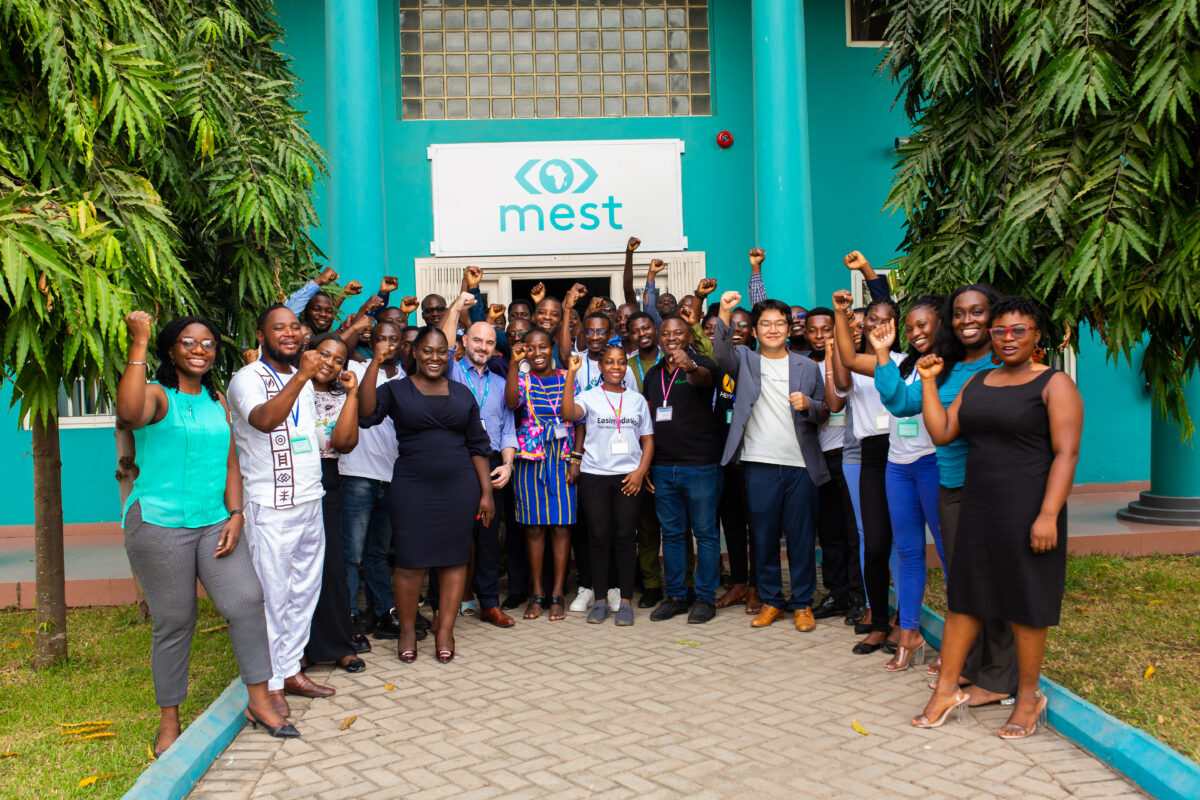Twenty social impact startups form this year’s cohort under the KOICA-UNICEF ‘Accelerating entrepreneurship and innovation in Ghana’ project.
Accra, Ghana – 10 January 2023. Talented innovators from 20 startups across Ghana have been enrolled as the third cohort in the UNICEF StartUp Lab today. Over the next six months, they will take part in a specific accelerator programme, which aims to improve their businesses and contribute to advance the SDGs for children and young people. The cohort comprises startups covering areas directly and indirectly impacting children, young people and their families, including in education, health, sanitation, climate action and adolescent well-being.
Established in 2019, the UNICEF StartUp Lab actively engages young Ghanaian startups in the development and promotion of innovative, open-source, market-driven products and digital solutions that help address complex problems affecting the well-being of children and young people, especially the most vulnerable.
“UNICEF is committed to supporting young people across Ghana who are generating entrepreneurial and innovative business ideas to support their communities. The UNICEF StartUp Lab accelerator programme provides them with valuable knowledge and capacity to improve their readiness and ability to succeed in the marketplace”, said Fiachra McAsey, UNICEF Representative ad interim.
This unique opportunity for young social impact innovators has attracted the support of the Korean International Cooperation Agency (KOICA). Recognizing the strong drive amongst Ghanaian youth to start their own businesses, KOICA is collaborating with UNICEF under the KOICA-UNICEF Accelerating Entrepreneurship and Innovation in Ghana Project to further expand the successful UNICEF StartUp Lab accelerator programme.
“There are just seven more years to reach the SDGs and that makes it critical to support programmes that will help to speed up progress to reach the goals. Through this collaboration, we hope that we can expediate entrepreneurship and innovation in Ghana, especially those that contribute to support the efforts of young entrepreneurs, whose determination will eventually contribute to the growth of the Ghanaian economy.” said the Senior Deputy Country Director for KOICA Ghana, Mr. Seungmin Oh.
UNICEF is also collaborating with MEST Africa to implement the programme. Participants will be able to access tailored groups, individual mentoring, networking opportunities. They will also be supported by a group of regional innovation hubs, and engage closely with technical experts from UNICEF, KOICA and MEST Africa. The startups will be able to access seed funding to enhance the digital components of their businesses through UNICEF and KOICA, and gain international and national investment opportunities including through the UNICEF Innovation Fund and the Digital Public Goods Alliance.
About MEST
MEST is a pan-African software and entrepreneurship training program, seed fund, and incubator helping to launch technology startups across the continent. Founded in Ghana in 2008 by serial entrepreneur Jorn Lyseggen, MEST is a 12-month program that provides critical skills training in software development, business, and communications to Africa’s burgeoning tech talent. MEST provides seed funding for the best ideas coming out of the program and continues to support the growth and development of its portfolio companies.
To date, MEST has trained 1000s of entrepreneurs from across the continent and invested in over 80 startups across industries from Agritech, Fintech, SaaS, eCommerce, Digital Media, and Healthcare amongst others. MEST is fully funded by the Meltwater Foundation, the non-profit arm of the Norwegian company Meltwater; a global leader in social and media intelligence headquartered in San Francisco.
About KOICA
The Korea International Cooperation Agency (KOICA) was established in 1991 by the Republic of Korea as a governmental organization to implement the Korean government’s grant aid and technical programs. KOICA Ghana Office has been supporting and implementing developmental programs in Ghana in four key sectorial areas - Public Health, Agricultural, Rural Development, Education, and Governance.
Ongoing flagship initiatives include; the Implementation of the Global Health Security Agenda (GHSA) in Ghana to build the country’s’ capacity to prevent, detect, and respond rapidly to infectious diseases for greater global health security, CHPS + project with the Ghana Health Service to strengthen the capacity of health systems in the Upper East Region, Rice Value Chain Improvement Project aimed at increasing the production of rice in Central Region, and the Girls STEM Project with Ghana Education Service to support young girls to pursue STEM courses at the higher level.
About UNICEF
UNICEF is a United Nations agency which works to uphold the rights and well-being of all children in 190 countries. Operating in Ghana for 40 years, UNICEF’s current mandate focuses on health, nutrition, water, sanitation, hygiene, education, protection, and social policy sectors, as well as adolescent and youth empowerment and social behavior change.
About the UNICEF StartUp Lab in Ghana
The UNICEF StartUp Lab was established in 2019 in Accra, Ghana. It is an accelerator that supports early-stage, tech-enabled startups in the development of innovative, market-driven solutions that help address complex challenges impacting the well-being of young people and adolescents. The UNICEF StartUp Lab integrates business incubation with wide-reaching technical expertise and systems knowledge in the social sector.

